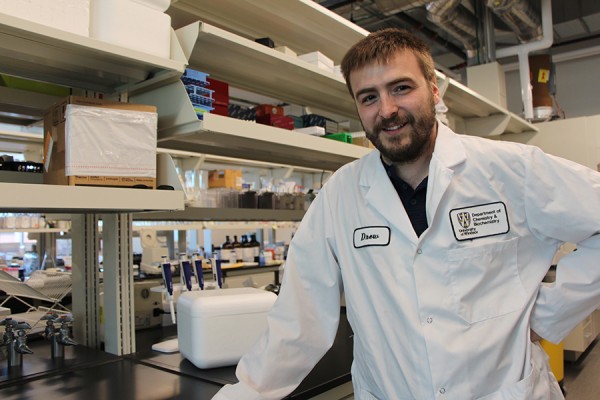 Chemistry professor Drew Marquardt has received federal funding to develop a new means of producing neutrons.
Chemistry professor Drew Marquardt has received federal funding to develop a new means of producing neutrons.
Two University of Windsor chemistry professors have won awards of $250,000 each to fund research into neutron generation and new drugs to treat rheumatoid arthritis.
John Trant and Drew Marquardt are among the first researchers in the country to receive monies from the New Frontiers in Research Fund. The funding initiative, paid through the Natural Science and Engineering Research Council of Canada, the Canadian Institutes for Health Research, and the Social Sciences and Humanities Research Council of Canada, supports early-career researchers as they make new discoveries.
Both Marquardt and Trant received the maximum amount available to researchers in the newly-created fund.
In addition, UWindsor’s Charu Chandrasekera, executive of the Canadian Centre for Alternatives to Animal Methods, will be working in conjunction with a colleague at the Université de Montréal on research into conducting chemical safety assessment without the use of animal testing. That research project was awarded a grant of more than $220,000 over two years.
Dr. Trant’s research will focus on designing peptide drugs to treat rheumatoid arthritis. Current treatments for the painful disease suppress the entire immune system, leaving sufferers more susceptible to infection and cancer. Trant proposes combining chemistry with computer design, 3-D bioprinting, biology and biophysics to create custom-tailored drugs that block the molecular events that lead to rheumatoid arthritis.
Trant’s research — to be conducted in partnership with immunologists, chemists, and other researchers in Canada and Australia — holds the promise of finding a new way to treat all autoimmune diseases.
“I am extremely honoured to have received this competitive award and it will allow my team here at Windsor and our collaborators to begin to test our hypothesis,” Trant said.
Dr. Marquardt’s research is into designing a new, compact instrument to produce neutrons which are used across a variety of scientific disciplines to investigate industrial and biological materials without destroying or altering them. This new neutron source, which will use the reaction between a low-energy proton beam and light elements such as beryllium and lithium to produce neutrons, will be the first of its kind, and will give Canadian researchers an alternative to using costly neutron sources in other countries now that the NRU Reactor at Chalk River has been decommissioned.
For his research, Marquardt will partner with the physics laboratory, TRIUMF, Canada’s national particle accelerator centre.
“I spent most of my PhD at the neutron source in Chalk River, and it is a real honour to be leading a project that will usher in the next generation of neutron sources,” Marquardt said.
“Neutron techniques have a broad range of applications ranging from biology to the automotive industry and even art history,” Marquardt explained. “We have gathered a team of experts from different disciplines to guide the specifications and capabilities of this new technology.”
The grants, funding Marquardt and Trant’s research over two years, is part of a $38.3 million announcement made recently by Kirsty Duncan, federal minister of science and sport, to support 153 early career researchers.
“Our government’s vision is for our researchers to take risks and be innovative,” Duncan said. She said the funding will give Canadian scientists and students access to state-of-the-art laboratories and equipment.
Ted Hewitt, SSHRC president and head of the committee that co-ordinated the New Frontiers in Research Fund, said financial support will allow Canadian researchers to make new discoveries and innovations.
“As society evolves, so must our means of doing research. The New Frontiers in Research Fund is supporting leading-edge research and promoting ideas that would have traditionally been unsupported,” he said.
“Through this program, we are truly paving the way for our emerging researchers to expand their horizons, take risks, and deliver outcomes that will benefit Canadians.”
─Sarah Sacheli
